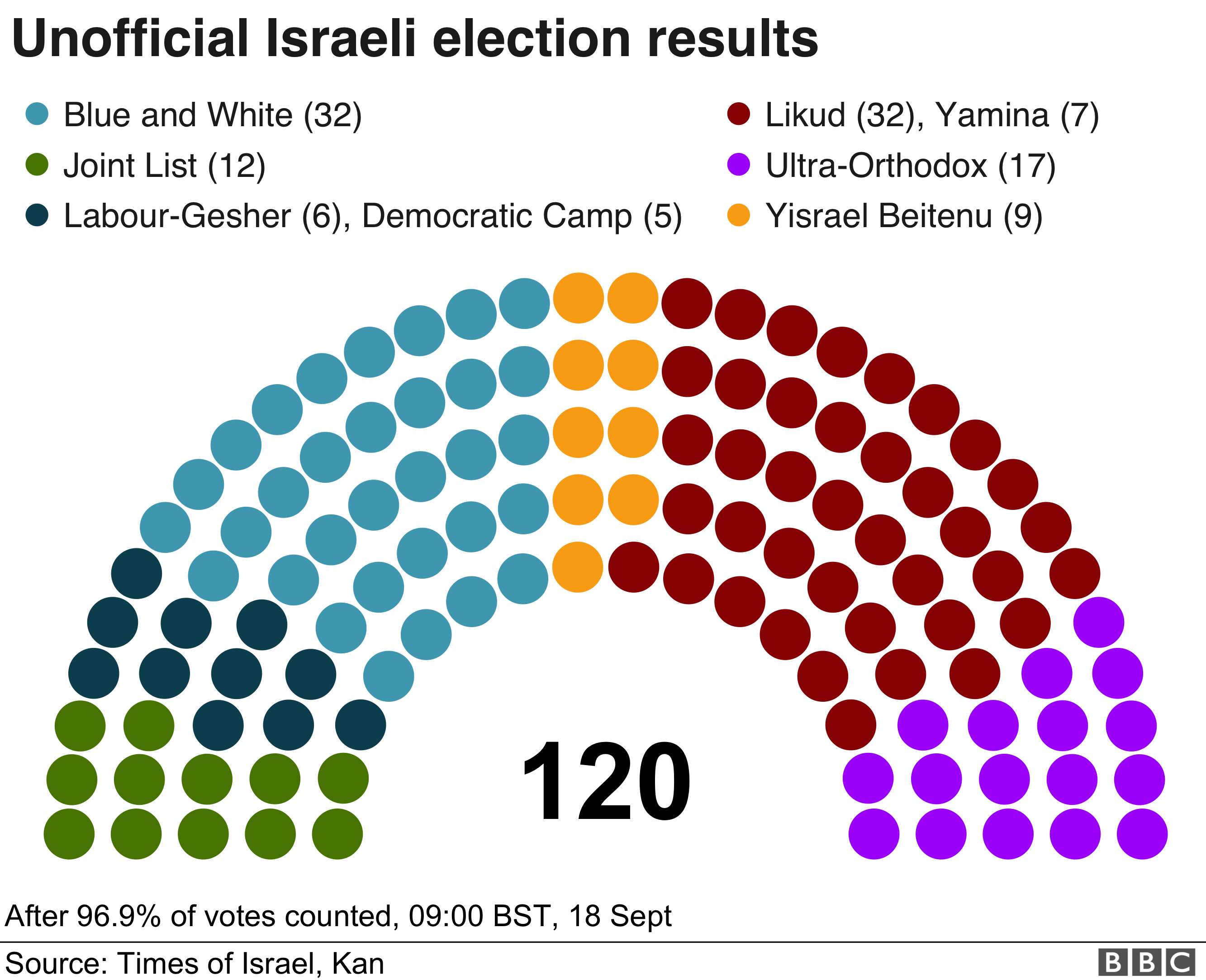Unofficial results in Israel's second election in five months suggest it is too close to call, Israeli media say.
Incumbent PM Benjamin Netanyahu's party and that of his main challenger, Benny Gantz, are neck and neck with 32 seats each, the Kan public broadcaster says.
A prime minister needs to command a 61-seat majority in parliament. The smaller Yisrael Beiteinu party appears to hold the balance of power.
Official partial results are expected on Wednesday morning.
Benjamin Netanyahu, Israel's longest-serving prime minister, has been in office for 10 years and is vying to win a record fifth term in office.
The 69-year-old, who leads the right-wing Likud party, has pledged to annex Jewish settlements and a swathe of other territory in the occupied West Bank if he is returned to power.
Palestinians, who seek a state in the West Bank and Gaza, with its capital in occupied East Jerusalem, have warned such a move will kill any hopes for peace.
Mr Gantz, who leads the centrist Blue and White party, has not advocated any form of annexation though his position on the creation of a Palestinian state is unclear.
Like Mr Netanyahu, he has ruled out ever dividing Jerusalem, which Israel considers its capital.
On Wednesday morning, Yisrael Beiteinu's leader Avigdor Lieberman, reiterated that he would only support a government comprising both Likud and Blue and White.
However, Blue and White has ruled out sitting with Mr Netanyahu in a coalition.
What are the latest results?
Official results have been slow to be released, with only 30% of votes counted by 09:15 (06:15 GMT).
They put Likud slightly ahead of Blue and White, with the ultra-Orthodox Shas party third and Yisrael Beiteinu fourth, but without indicating how this translates into seats in the knesset (parliament).
According to the Times of Israel, Kan is reporting unofficial results based on what it says is 96.9% of votes counted.
Netanyahu weakened
Analysis by Tom Bateman, BBC Middle East correspondent, Jerusalem
The prime minister is well short of being able to form a governing bloc of right-wing and religious parties that are prepared to sit with him. In fact the result leaves him in an even weaker position than he was after April's vote.
It's almost impossible to predict the outcome, with frenetic horse trading on the way, even the chance of parties fragmenting or politicians shifting allegiances. But as it stands three broad themes seem among the possibilities:
- A dominant new governing bloc of the two big rival parties: Likud with Blue and White. This only seems possible without Mr Netanyahu as Likud leader. Needless to say that's a deal breaker for him and so far at least, for his party
- Mr Netanyahu's political rival Avigdor Lieberman miraculously changes his mind and agrees to join a right-wing and religious Netanyahu government - something his voters understood would never happen
- A third election - which nobody here has an appetite for.
In the meantime, Mr Netanyahu stays on, but watch this space. For a few weeks.
![]()
There was a muted response at Likud's election night headquarters in Tel Aviv.
Hundreds of chairs for party supporters remained empty, as activists were kept outside the hall and leaders digested the numbers.
Likud's foreign affairs director noted that Israeli exit polls had got things wrong in the past. Last time, they underestimated the number of votes for Likud and also for some of the religious parties allied to Mr Netanyahu.
"There is no point starting to work out a coalition based on these numbers as they will change," Eli Hazan said.
But Blue and White was "cautiously optimistic" that Israel would get new leadership, spokeswoman Melody Sucharewicz told the Times of Israel.
What could happen next?
The BBC's Tom Bateman says that if the projections are correct Mr Netanyahu has no simple route to government.
In fact, the figures put him in an even weaker position than after April's election, when coalition talks collapsed, he adds.
Mr Lieberman prevented Mr Netanyahu from forming a coalition after that vote because he refused to back down over a longstanding dispute with religious parties over exempting ultra-Orthodox young men from military service.
Mr Gantz could have an even more complex job to form a government, because of differences between left-wing parties.


